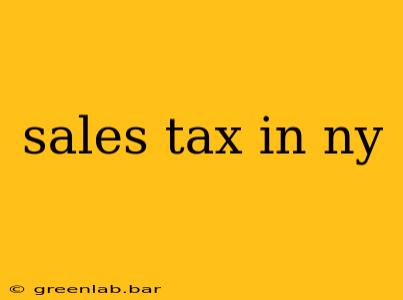New York State has a complex sales tax system, varying significantly depending on location and the type of goods or services purchased. This guide provides a comprehensive overview to help you navigate the intricacies of sales tax in NY.
What is New York Sales Tax?
Sales tax in New York is a consumption tax levied on the sale of most goods and services. The revenue generated contributes significantly to the state and local government budgets, funding essential public services. The rate isn't uniform across the state, leading to potential confusion for both businesses and consumers.
New York State Sales Tax Rate
The base New York State sales tax rate is 4%. However, this is just the starting point. Many localities impose additional taxes, resulting in higher combined rates.
Local Sales Taxes: A Patchwork of Rates
Local sales taxes are imposed by counties, cities, towns, and villages. These rates vary considerably, and it's crucial to know the specific rate applicable to your location. For example, New York City has a significantly higher sales tax rate than many upstate areas. To find the exact combined rate for your location, you'll need to consult the New York State Department of Taxation and Finance website or use their online sales tax calculator. This variability underlines the importance of understanding your precise location's tax implications.
Goods and Services Subject to Sales Tax
While most goods and services are subject to sales tax in New York, several exceptions exist. Understanding these exemptions is crucial for both businesses and consumers to avoid overpaying or underpaying. Key categories include:
-
Exempt Goods: Certain food items (with some exceptions), prescription medications, and most clothing items below a certain price point are generally exempt. The specifics of these exemptions can be quite detailed, so referring to the official NY Department of Taxation and Finance resources is essential.
-
Exempt Services: Many professional services, such as legal or medical services, are typically exempt from sales tax. However, there are exceptions, and this can vary based on the specifics of the service.
Calculating Sales Tax in New York
Calculating sales tax can be straightforward once you know the applicable rate. Simply multiply the purchase price by the combined state and local sales tax rate.
Example:
If you buy an item for $100 in a location with a combined sales tax rate of 8%, the sales tax would be $8 ($100 x 0.08), and the total cost would be $108.
Navigating Sales Tax as a Business in New York
Businesses operating in New York must register with the Department of Taxation and Finance, collect sales tax from customers, and remit it to the state periodically. Failure to comply can result in significant penalties. The specific requirements vary depending on the type of business and its location. Understanding these requirements is crucial for maintaining compliance and avoiding potential legal issues. The Department of Taxation and Finance website provides comprehensive resources and guidance for businesses.
Frequently Asked Questions (FAQs)
This section will address commonly asked questions regarding sales tax in New York. This section would be expanded in a full-length blog post.
Conclusion
Navigating the sales tax system in New York requires careful attention to detail due to the variability of rates across the state. Understanding the base rate, local additions, exemptions, and business requirements is crucial for both consumers and businesses. Utilizing the official resources from the New York State Department of Taxation and Finance is essential for accurate information and compliance.

